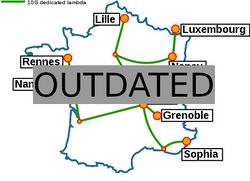Grid5000:Home
|
Grid'5000 is a large-scale and versatile testbed for experiment-driven research in all areas of computer science, with a focus on parallel and distributed computing including Cloud, HPC and Big Data. Key features:
|
Random pick of publications
Five random publications that benefited from Grid'5000 (at least 2932 overall):
- Gaël Vila, Emmanuel Medernach, Inés Gonzalez, Axel Bonnet, Yohan Chatelain, et al.. The Impact of Hardware Variability on Applications Packaged with Docker and Guix: a Case Study in Neuroimaging. ACM REP'24, ACM, Jun 2024, Rennes, France. pp.75-84, 10.1145/3641525.3663626. hal-04480308v2 view on HAL pdf
- Rémi Meunier, Thomas Carle, Thierry Monteil. Multi-core interference over-estimation reduction by static scheduling of multi-phase tasks. Real-Time Systems, 2024, pp.1--39. 10.1007/s11241-024-09427-3. hal-04689317 view on HAL pdf
- Wedan Emmanuel Gnibga, Andrew A Chien, Anne Blavette, Anne-Cécile Orgerie. FlexCoolDC: Datacenter Cooling Flexibility for Harmonizing Water, Energy, Carbon, and Cost Trade-offs. e-Energy 2024 - 15th ACM International Conference on Future and Sustainable Energy Systems, Jun 2024, Singapore, Singapore. pp.108-122, 10.1145/3632775.3661936. hal-04581701 view on HAL pdf
- Pierre-Etienne Polet. Portage des chaînes de traitement sonar sur architecture hétérogène : conception et évaluation d'un environnement de programmation basé sur les tâches moldables. Informatique cs. Ecole normale supérieure de lyon - ENS LYON, 2024. Français. NNT : 2024ENSL0004. tel-04633261 view on HAL pdf
- Volodia Parol-Guarino, Nikos Parlavantzas. Auction-based Placement of Function Chains in the Fog at Scale. Europar 2025 - 31st International European Conference on Parallel and Distributed Computing, Aug 2025, Dresden, Germany. pp.1-14. hal-05121317 view on HAL pdf
Latest news
Failed to load RSS feed from https://www.grid5000.fr/mediawiki/index.php?title=News&action=feed&feed=atom: Error parsing XML for RSS
Grid'5000 sites
Current funding
As from June 2008, Inria is the main contributor to Grid'5000 funding.
INRIA |
CNRS |
UniversitiesUniversité Grenoble Alpes, Grenoble INP |
Regional councilsAquitaine |


